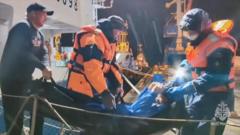Mikhail Pichugin, a 46-year-old Russian man, was miraculously rescued after enduring over two months adrift in a small inflatable boat in the Sea of Okhotsk, a treacherous body of water in Russia's far east. The ordeal began in early August when Pichugin, his brother Sergei, and his 15-year-old nephew Ilya set out to sea intending to watch whales, equipped with food supplies intended to last two weeks. Tragically, only Pichugin survived, with the bodies of his brother and nephew found aboard the boat by the rescuers.
A fishing boat crew stumbled upon the adrift vessel nearly 1,000km from where the group had initiated their journey. Pichugin's wife, speaking to RIA Novosti, attributed his survival to both luck and his initial weight, which was significant at the start of the trip and likely provided some buffer during the extended period of scarcity. Upon rescue, Pichugin was visibly emaciated, having lost half his body weight, yet managed to communicate his exhaustion to the rescuers.
The Russian seafarers' union suggested that Pichugin's ability to catch fish might have been key to his survival, providing crucial sustenance when other provisions ran out. His survival story is reminiscent of previous tales of castaways defying similar fates, including Soviet soldiers surviving adrift in the Pacific for 49 days back in 1960.
Currently, Pichugin is recovering in a hospital, where he remains in a "more or less stable" condition. Meanwhile, prosecutors have initiated a criminal investigation to unravel the circumstances surrounding the incident, with inspections being conducted on the vessel itself. The haunting episode serves as a stark reminder of the sea's unpredictable nature and the thin line between survival and disaster.
A fishing boat crew stumbled upon the adrift vessel nearly 1,000km from where the group had initiated their journey. Pichugin's wife, speaking to RIA Novosti, attributed his survival to both luck and his initial weight, which was significant at the start of the trip and likely provided some buffer during the extended period of scarcity. Upon rescue, Pichugin was visibly emaciated, having lost half his body weight, yet managed to communicate his exhaustion to the rescuers.
The Russian seafarers' union suggested that Pichugin's ability to catch fish might have been key to his survival, providing crucial sustenance when other provisions ran out. His survival story is reminiscent of previous tales of castaways defying similar fates, including Soviet soldiers surviving adrift in the Pacific for 49 days back in 1960.
Currently, Pichugin is recovering in a hospital, where he remains in a "more or less stable" condition. Meanwhile, prosecutors have initiated a criminal investigation to unravel the circumstances surrounding the incident, with inspections being conducted on the vessel itself. The haunting episode serves as a stark reminder of the sea's unpredictable nature and the thin line between survival and disaster.



















